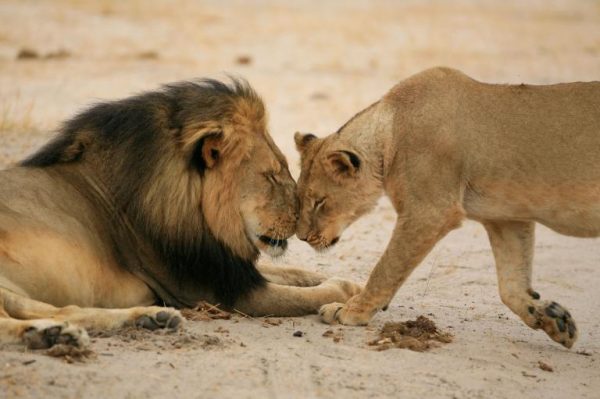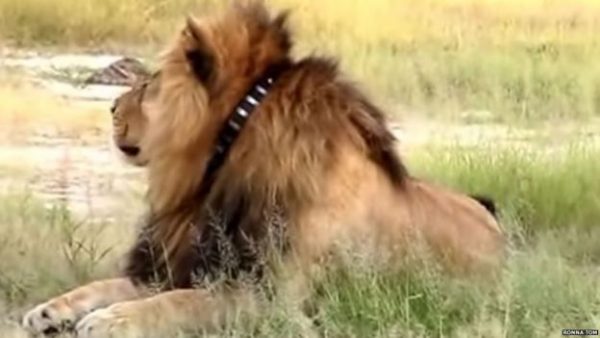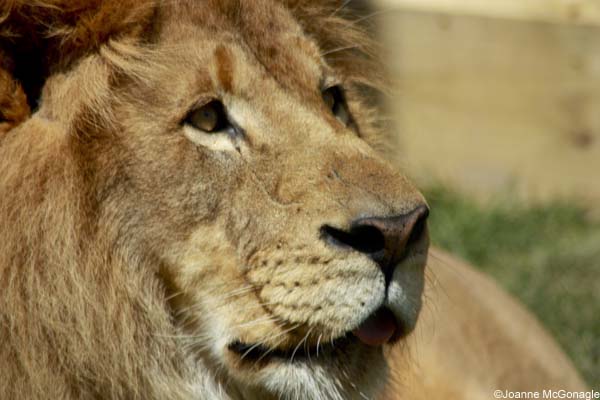
Image of Cecil by Ronna Tom
The Murder of Cecil the Lion
A year ago, Cecil, a beloved African lion in Zimbabwe’s Hwange National Park, was shot and killed by Walter Palmer, a dentist from the United States. Palmer paid around $54,000 to bow-hunt Cecil. On July 1, the dentist hit the lion with an arrow on a farm outside the national park, a place where Cecile was known to explore. Palmer and his guide tracked Cecil for over 11 hours and shot the collared lion again taking the lion’s life.

Cecil with collar image by Ronna Tom
The murder of Cecil, a 13-year-old lion with a glorious black mane sparked international outcry when news spread rapidly across the world via social media. Cecil was the star of Hwange National Park and he was one of the Wildlife Conservation Research Unit’s (Wildcru) radio collared lions. The contempt for Walter Palmer was so intense the dentist was forced to close his practice and go into hiding until the public quieted down. One could argue that Palmer was one of the most hated people on earth.
Cecil’s death brought on the largest global response to a wildlife story in history according to Wildcru director David Macdonald. The death of Cecil caused more people to examine and evaluate lion trophy hunting in Africa and how this “sport” is remotely connected to lion conservation.
Actions Taken After Trophy Hunting Scrutiny
In the last year, lion trophy hunting scrutiny resulted in the following actions.
- The US Fish and Wildlife Service agency placed strict requirements on all future lion trophy import regulations by listing lions as “threatened” on the US Endangered Species Act and also invoking Article 4d. meaning any further lion trophy hunt import must be shown to benefit the conservation of that species;
- The European Union now requires import permits to be issued for any lion trophy hunting product. Every EU country will be required to demonstrate that such trophy hunting imports are “sustainable”. The “sustainability” requirement needs more definition to be effective.
- Australia, France and the Netherlands have banned any future lion trophy hunting imports. The US State of New Jersey will no longer allow such imports. Pressure is placed on the other EU nations to join this movement and other US States to join New Jersey.
- The UK’s Under Secretary of State for Environment told LionAid he will review the policy on allowing lion trophy imports into the UK in October, with a view to aligning the UK with the US position.
- In the USA legislators have proposed the Conserving Ecosystems by Ceasing the Importation of Large (CECIL) Animal Trophies Act to extend current U.S. import and export restrictions on animal trophies to include species that have been proposed for listing as threatened or endangered under the Endangered Species Act.
- More than 40 airlines, including American Airlines, British Airways, JetBlue, Delta and Air Canada, announced or reaffirmed bans on transporting trophies from the big five species, lions, rhinos, elephants, leopards, and Cape buffalo.
The Impact of Trophy Hunting

photo by Joanne McGonagle
Since Cecil’s death, pro-trophy hunters continue to claim that if lion trophy hunting is stopped, the land will be converted to farmland. Botswana however, banned all trophy hunting and is successfully converting former hunting concessions into the more profitable photographic tourism landscapes.
According to Craig Packer, director of the Lion Research Center at the University of Minnesota, sport hunting is not all good, but it is not all bad, but the bad outweighs the good across the African continent. A report by the International Fund for Animal Welfare shows that hunters will pay from $24,000 to $71,000 to hunt lions in Africa. This is more than any other trophy species. An estimated 8,200 African lion trophies were imported between 2004 and 2014, the 6th highest of any internationally protected species. Our American Black Bear is number one. Trade rates for lion parts have increased faster than an other protected species.
One recent report by the Democratic staff of the U.S. House committee on Natural Resources found there is little evidence to show that trophy hunting fees help conservation, especially in corrupt nations.
Cecil’s death focused a spotlight directly on trophy hunting to reveal it as selfish and conservation-negative.
As for Walter Palmer, despite the illegalities involved in Cecil’s death, the dentist seems to have been exonerated. No longer hiding from the public, Palmer attended the recent Republican National Convention as a special guest of Trump’s trophy hunting sons.
Cecil the lion’s killer, Walter Palmer, with Trump’s trophy hunting son at the RNC Convention #boycotttrophyhunting pic.twitter.com/v0uoR2Ugmj
— Abhi Kulkarni (@kalifornier) July 20, 2016
cecil….we lovez ya dood ~~~~~~~ we hope uz small catz livez ta see de day when hunting iz stopped…..period…..
That Walter Palmer has no shame is evident in his appearange in pulbic supported by other animal killers. The power of the law must be used to stop lions being killed, and trophy hunting to be stopped.
this was a little too late to save this magnificent animal as with all killings of animals. no one ever gets really punished for the crimes. i can imagine what is going to happen if trump gets in and his son is appointed for some office. any progress will be reversed, i fear.
Awesome to see all this progress! But clearly there is a LOT more work to be done.